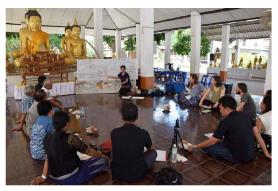Keywords: shared values// legacies // values-based evaluation// social legacies // community impact// transdisciplinary research// Bhutan// Thailand // GPI Atlantic |
External Funder: UKRI: AHRC (Arts & Humanities Research Council) |
Key team members: MKH; EH; JA |
Key Contributions to WeValue Platform Knowledge: |
This project built on what was already known about values-based views of community legacies: that they could easily be identified after participants underwent a process of shared values crystallization (the WeValue InSitu process). |
The new frontier was: was that process transferable to entirely different cultural contexts? And, could non-expert community practitioners successfully take over the apparently complex, experientially-learned, Facilitation of that process? This was necessary in order for WeValue InSitu to ever have widespread use, because it required highly localised materials and meaning-making in order to ‘crystallize’ local knowledge. |
This project proposed that local practitioners who already had some experience of interacting with academics might be able to quickly become competent in WeValue InSitu approaches, if they first experienced it themselves and were given experiential examples of principles for adapting it. The result would be passed-on transdisciplinary capacity to make normally-intangible local shared values more-explicit. |
A most challenging topic was chosen: identifying the locally-perceived legacies from the ‘Stories of Amazing Resilience’ (SOAR) and ‘Gothkad’ (Happiness) Village projects led by GPIAtlantic and its local partner in Bhutan, the Youth Development Fund (YDF). These projects are part of the wider programme of developing Gross National Happiness pioneered in Bhutan. |
The excellent and pleasant Final Report(https://sberg.fudan.edu.cn/pdf/19GPIValues2017Projectreport29Dec2017.pdf ) |
conveys the amazing co-creation and co-production journeys that took place, with two practitioners who adapted WeValue InSitu and took it to their local, remote rural communities, and identified rich, bespoke and authentic legacies perceived by the villages. |
Because of this project, we now knew that the WeValue approach had a second strand of great usefulness: to help people to view aspects of their lives (like a project, OR government services, OR their organizational performance) through a shared-values lens, and identify and make explicit otherwise less-tangible information. We went on to use this premise in many other applications. |
Relevant papers published: #17 in the Publications List Official Project information: |
Official websites GtR https://gtr.ukri.org/projects?ref=AH%2FN007751%2F1 |
This is the official UKRI site, including detail about the purpose, results, impact, partners. |
Official purpose: |
This is a Follow-On Impact project, to transfer approaches developed in the 'Starting from Values: Evaluating Intangible Legacies' Connected Communities project to an established international programme in Asia. |
|
Project findings and impact |
Collaborators and participants from Thailand, Bhutan, Cambodia, Myanmar, Canada and the UK have benefitted from the project in the following ways: |
• The Thai Volunteer Service TVS youth leaders and key staff have a new approach to evaluating legacies of their projects. |
Although participants and their organisations benefited as described above, the partner GPI Atlantic was not found to be as well-placed as initially imagined in order to assist scaling out to global practice. Other pathways to global impact would thus be needed. |
Formal documents and publications |
Project Final Report: https://sberg.fudan.edu.cn/pdf/19GPIValues2017Projectreport29Dec2017.pdf |
This is a pleasant-to-read final report which is a pleasant journey through the project…please take a look! |
Further information |
The AHRC Connected Communities ‘Starting from Values’ project developed an approach for identifying and articulating the legacies of partnership projects – in particular universitycommunity projects. The notion of legacy is based on subjective values of the people identifying it, and legacies of a project are typically viewed using the same values-lens as the project and its outcomes. But they can also be identified and viewed through a variety of different lenses, including those of the participants, and beneficiaries. In this previous AHRC project, University of Brighton (UoB) and its partners showed that by starting from eliciting and articulating local values, using our specialised approaches, it is possible to identify a broader spectrum of outcomes from projects, to open spaces for examining deeply personal and ‘intangible’ aspects, and finally to articulate cultural legacies of projects from these different values perspectives – in a rigorous and systematized way. |
Our results also indicated that it is necessary to make use of arts and humanities approaches to identify and capture such legacies. With carefully facilitated arts and humanities approaches, and by starting with values, we can elicit, collect – even take measures of – more representative and inclusive legacies. This approach, developed both empirically and theoretically through the Starting from Values project, allows us to go beyond objectively measurable outcomes by capturing measures of legacy that require an explicit recognition of embedded multi-subjectivity and values-judgements. Furthermore, we found that participants in partnership projects who might initially have a difficulty in articulating well-defined indicators of achievements were more easily able to do so after following our values-based approach to legacies. In other words, when partners were facilitated to articulate their legacies with our approach, this proved excellent preparation for them to then develop local appropriate indicators for assessment. |
This initially subtle point is what stood out as an important innovation to our new partners in international development projects, GPI Atlantic, a Canadian NGO with 15 years’ experience in asset-based community development. They expressed a clear need for capturing and evidencing cultural legacies of their projects. Though they have extensive experience developing indicators at programmatic, community, national and international levels, their previous development of community-level wellbeing indicators involved time-consuming, bespoke projects at each location. Previous community-level indicator work required enormous support and research from indicator experts and staff from GPI Atlantic (who collected input from the community through surveys, focus groups and interviews, and developed the indexes themselves). They already used a participatory, contextually-sensitive approach to partnership and program development, and used participatory, asset-based facilitation approaches for developing progress and behavioural indicators for their internship programs. However, GPI Atlantic recognized in our approach, the value of integrating participatory and visually-based elicitation approaches in the collaborative production of values-based indicators for community-level projects. GPI Atlantic thus had a well-defined need which they immediately recognised that our approach could benefit. Our system of developing local indicators for asset-based community development bridges the gap between previous GPI Atlantic projects that support GNH communities (such as the Gakhid Village Project in Bhutan), and GPI Atlantic's extensive community profiles for the community GPIs in Canada. |
UoB and GPI Atlantic discussed possible opportunities to co-develop the approach for GPI’s context, first identifying the possibility of working with GPI Atlantic’s partners in Bhutan. When practical obstacles related to obtaining visas for entry into Bhutan could not be overcome, the focus switched to work with another of GPI Atlantic’s partners, the Thai Volunteer Service (TVS) in Thailand. TVS had been involved in the third Gross National Happiness (GNH) conference and their work continues to be related to a broader – and both implicit and explicit - ‘GNH Youth Movement’ in the region, including long-term connections with work done in Bhutan. |
Project impact |
This project has enhanced and extended internationally the pathways to impact identified in the ‘Starting from Values: Evaluating Intangible legacies’ project by working with a new partner to demonstrate the relevance of the values-based approach to capturing legacies in the context of asset-based community development based in principles of action research. |
The project demonstrated WeValue InSitu can take place in a context where multiple languages co-exist and translation and transposing have been needed, which has demonstrated the usefulness of the approach in a most challenging environment. |
Longer-term benefits: |
• Project beneficiaries and participants within villages may gain insights into their values and the legacies of these projects. |
• GPI Atlantic research staff and volunteers, as well as TVS youth leaders, will develop expertise in using a new values-based tool for community-level assessment of their projects. |
• GPI Atlantic and TVS may be able to demonstrate the cultural legacies of the GNH youth movement and GNH aligned community initiatives to other organisations, funders, governments by lending authority to different forms of knowledge. |
• GPI Atlantic has the ingredients for developing a new approach that can bridge community and regional-level assessments of community wellbeing. |
• The University of Brighton will benefit from wider impacts of their work and insights into the usefulness of this approach for practitioners in community-led development |
Learning from project team |
This section summarises some of the learning from the project team after reflecting on the training process. a) Legacies vs. evaluation. legacies as difficult to translate b) GNH values framework? Works best from perspective of GNH lens (more general and directly relevant to community context) Problem of ‘cultural preservation’ (note: rephrased in lens)…GNH coming from Bhutan, very specific view of development and cultural identity c) Efficiency? Not the best for youth leadership context. values take time, don’t want to rush d) We’ve learned indirectly where slow learning and happening over and in-between other events. Similar to ARN. Meditation e) Usefulness of the triggers?? Vs elicitation. how people use or interact with trigger statements, challenges of wording f) Community standards >> elicitation to trigger statements. Reflections from Hasta and Alana. Importance of trying to lead a bit first before leading a group g) Making values statements: easy in English language, separation of concepts rather than systemic way of telling things (like Chinese) h) Integrating participatory learning – co-design and co-delivery i) Completeness – need for facilitation j) Clarity of process- need for more information upfront and a guide to the process. a. This relates to the context of working with community development leaders – they are familiar with many of the methods employed in eliciting and refining value statements. It’s important to tailor the experience to their expertise for them to stay engaged. |
Partners |
Principal Investigator: |
Professor Marie Harder, Values & Sustainability Research Group, University of Brighton |
Academic Co-Investigators: |
Elona Hoover, Values & Sustainability Research Group, University of Brighton |
Non-academic Co-Investigators: |
Hasta Colman, Nora Didkowsky, Alana Ziegler, Ryan Patey, Jon Marcucci and |
Gwendolyn Myring-Colman (GPI Atlantic) |
Partner institutions: |
Bhutan’s Youth Development Fund (YDF) |
Thai Volunteer Service (TVS) |
TVS-supported GNH youth movement in Thailand |




